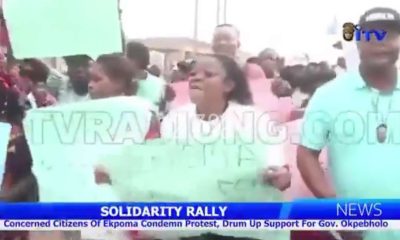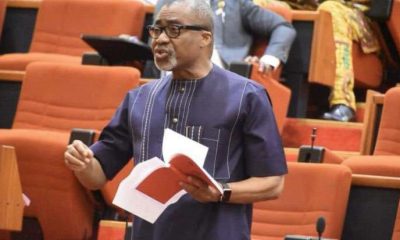Politics
‘APC’s rigging machine:’ New report indicts INEC in Edo polls

A recent report by the Athena Centre for Policy and Leadership, an organisation which offers non-partisan policy analysis through suite of publications, has indicted the Independent National Electoral Commission (INEC) in the alleged manipulation of the September 21 governorship election in Edo State, further raising deep concerns about the integrity of the electoral umpire as the country begins countdown to another general election in 2027.
The country’s electoral umpire had after making series of commitments to credible process ahead of the 2023 general election, raising the hope of the Nigerian populace, especially the youths, who invested energy and emotions into the electioneering campaigns, ultimately dashed those hopes by conducting elections that left much to be desired.
The promised upload of polling units results in real time during the presidential election was never to be realized as the commission’s Results Viewing Portal (IReV) suddenly developed a technical glitch that has not been properly explained till this day, while the courts, all the way to the Supreme Court, validated the ‘faulty process.’
The conduct of the election and its outcome caused many to lose hope in the Nigerian electoral system, and while some may have reasoned that post 2023, the commission will make conscious efforts to redeem its image and reputation, things seem to have gone further south with subsequent elections, with the governorship election in Edo being, for many, the height of it.
“The Edo election taught me that we should never underestimate these vagabonds in power and their desire to control everything,” said Victor Asemota, a tech expert and public affairs commentator. “When you think nothing is happening, everything is happening. For you, it is idealism and identity, for them it is survival. Everything is corrupted.”
INEC, it would be recalled, had on Sunday, September 22, declared Monday Okpebholo of the All Progressives Congress (APC) winner of the Edo election. The APC candidate, according the official results announced by the commission, secured 291,667 votes to defeat his closest rival, Asue Ighodalo of the Peoples Democratic Party (PDP), who polled 247,274 votes. Labour Party’s Olumide Akpata came third with 22,763 votes.

But it was an outcome that surprised many, especially those familiar with the general mood of people of the state in the days leading up to the election. Business Hallmark few days to the election, interacted with many residents of the state with the feedback suggesting an impending victory for the PDP and its candidate, Ighodalo.
But in the event, the APC emerged, albeit after a process many observer groups concluded fell short of minimum acceptable standards in their various reports, with concerns mounting with respect to what Nigerians would expect in the all important 2027 general election.
“I think it will extremely foolhardy for anyone, given what we have seen of INEC, to expect that the 2027 election will be decided by the ballot. In 2023, we had hopes, but INEC pooed on its own guidelines and made nonsense of the technologies it deployed to ensure credible process, and the court backed them,” said Anthony Chidi, a legal practitioner and political commentator based in Enugu.
“Now, what has happened since then, which played out in Edo, is that the BVAs have become useless, the idea of technology has been made nonsense of and we are fully back to the dark days of electoral malfeasance in the country. The question is not whether the 2027 election will be rigged, it is when will Nigerians decide that enough is enough.”
Meanwhile, the Athena Centre in the report released last week, following a proprietary data analytical framework on the election, noted among others, that INEC denied it access to form EC40Gs – used by INEC to record cancelled results – and forms EC8Bs – used to collate polling unit results at the ward level – for 12 wards in the state, raising concerns about the transparency of the electoral process.
Its analysis, it said, “revealed both vote inflation and vote reduction at Ward Collation Centre, highlighting systemic weaknesses in the result collation process and opportunities for electoral malpractice.”

According to the report, “the huge difference between voter accreditation and EC8D accredited voters suggests possible manipulation of the Biometric Voter Accreditation System (BVAS),” stating further that “despite the inflated accreditation figures, over-voting was identified in 186 polling units, further undermining the integrity of the process.”
The report also revealed that BVAS accreditation record was not transmitted to INEC Result Viewing portal (IReV).
Compromised By Design?
The outcome of the Edo election, observers say, suggests a premeditated plot at highest levels of the country’s polity to ensure an APC victory in the state. Indeed, much earlier in 2023, long before the country’s ruling party held its primary election, President Bola Tinubu had hosted leaders of the party from the state in Abuja, during which he assured them that he would deliver the state to them.
“You know me very well, and you know Adams Oshiomhole too. We’re still going to fight further. Don’t worry, we’re with you, you will not work alone,” Tinubu told the APC leaders from Edo, who visited in Aso Rock weeks before the party’s primary. “One thing I can assure you is that, yes, do you want the Edo back? I am the president of the Federal Republic of Nigeria. I will bring Edo back to you.”
The first strategic move in this respect, it seems, was the deployment of Dr. Anugbum Onuoha, a cousin to Nyesom Wike, minister of the FCT, who is a political adversary of Godwin Obaseki, the immediate past governor of the state, as the Resident Electoral Commissioner (REC) in the state.
Though the PDP kicked and demanded for the removal of Onuoha, who had served both as Commissioner of Lands and Special Adviser on Land and Survey to Wike while he was governor of Rivers State, INEC insisted, and the rest is now history.
Indeed, questions had also been raised about Prof. Rhoda Gumus, the National Electoral Commissioner for South South alleged to be a card-carrying member of the APC and a prominent political figure in Edo State Politics.
The returning officer for the election, Prof. Farouk Kuta, also received criticism for allegedly failing to make decisions on key issues related to the voting and counting process.
Athena Centre in its report, noted that Prof. Kuta didn’t use his authority right, according to INEC Electoral Act 2022, section 6 (a), (b), (c ), (d), section 7, section 8;
According to Section 64 (4), “A collation officer or returning officer at an election shall collate and announce the result of an election, subject to his or her verification and confirmation that:
a). Number of accredited voters stated on the collated result are correct and consistent with the number of accredited voters recorded and transmitted directly from polling units under Section 47(2).
b). The votes stated on the collated result are correct and consistent with the votes or results recorded and transmitted directly from polling units under section 60(4) of this Act.”
When, after its field assessment, Business Hallmark confronted an APC chieftain in the state with its findings, which indicated that the party was unpopular and was likely to lose the election to the PDP, the chieftain, who does not want his in print had told our correspondent that the election would be over before 12pm, with Okpebholo being eventually declared winner.
“I can tell you that everything has been taken care of. The electoral officers are onboard. The election will be decided before 12pm,” he had said.
Asked about possible blow-back, he had argued that the political class is already aware that Nigerians are docile, and nobody is ready to risk their lives because of politics. He explained further that President Bola Tinubu is aware that he’s losing his Northern support base, and will do everything possible to win Edo and spread further in the South South.
“The election in Edo State was compromised by design,” said Osita Chidoka, former minister of aviation and founder of the Athena Centre. “For the very first time, I’m distressed that INEC as an institution will put its reputation at stake for the purpose of an election.”
For the purpose of its research into what transpired during the said election, the Centre said it downloaded results from INEC’s IReV website and analysed same with proprietary tool; made freedom of information (FOI) request to the commission on September 23 and October 25, requesting from EC8B, EC8D, EC8E and EC40G, out of which the commission provided only forms EC8B, EC8D and BVAS generated report.
In collecting data, the Centre said it used a 2-step verification process, with a quality assurance team performing further checks to ensure data integrity, while noting that the challenge it faced in trying to obtain the Certified True Copies (CTC) of election results constituted a limitation, highlighting gap in transparency.

Of the state’s 2,629,025 registered voters, spread across 4,519 polling units in 192 wards of the 18 local government areas of the state, a total of 210,209 registered voters, according to the report, were affected in the 363 polling units the commission failed to release. In all, 12 wards were not released to the centre by the commission, 11 of which, constituting 284 polling, are in Etsako West, while one ward which has 77 polling units, is Ikpoba/Okha.
The commission, according to Athena, only made available from EC40G for six polling units, three in Akoko Edo and three in Ikpoba/Okha.
The Centre, from available data, observed that there were discrepancies between BVAS voter accreditation figures and EC8D voter accreditation figures, which according to it, suggests possible incidence of tampering with the BVAS. Specifically, there were 687,427 accredited voters in the Certified True Copy of BVAS Generated Report; 580,616 accredited voters in form EC8A downloaded from IReV; 541,283 accredited voters in form EC8B certified by INEC and 604,123 accredited voters in form EC8D.
The report noted that there were 794 polling units with inflated BVAS record, which highlights it vulnerabilities and casts doubts over its credibility in elections. Yet, beyond the inflation of BVAS accreditation figures, the report identified over voting in 186 polling units, out of which results from 140 units or 75 percent of the 186, were transferred to form EC8B.
“Inflation of APC votes”
Reflecting on the conduct of the Edo election and what transpired during the election recently, Samson Itodo, the executive director of Yiaga Africa, one of the leading NGOs that monitored the election, observed that in many instances, there were inflation of the votes of the APC and the suppression of PDP votes.
“In this election, Yiaga Africa deployed its process and results verification for transparency (PRVT) methodology, and what the methodology is to look at a random sample of polling units, deploy stationary observers, who stay at the polling units from the commencement to the end of the process,” Itodo said during an appearance on Arise TV.
“And because we deployed to representative samples of polling units, we were able to release what we called estimates for the vote share that each candidate is supposed to get. The election is the 17th governorship election that we have deployed this methodology, and we have also deployed in two presidential elections in 2019 and 2023, and they were all deployed successfully.
“What happened in the Edo election, for instance, is that we get results from the sample polling units, and because we apply statistical principles and technology, we’re able to provide information that represent what happened in other polling units. For this election, the process of accreditation, voting and recording of results at the polling units complied substantially with the procedures. In other words, those processes were seamless and transparent.
“The challenge with the election is that when the results came to the collation centers, in those four local governments that we highlighted, those results were manipulated and altered, so the vote shares fell outside the margin. This was the same across the board. The real issue with the election is the collation process.
“If you look at Oredo, for instance, there was a 10 percent increase in the votes of the party that won the election, and those results based on our analysis, were deducted from one of the parties and added to the winning party. There were a lot of deductions and additions at the collation level.
“In places like Ikpoba/Okha, where collation was disrupted, the guideline is very clear, the collation was not done at the local government level even though there was no provocation. We had observers who were there to observe this process, and you see clearly that there’s a lack of transparency.”
Strikingly, the Athena Centre report found that there was significant vote inflation at ward collation centres which highlight vulnerabilities in the collation process and opportunities for electoral malpractice. Specifically, the report said there was observed addition 32,384 votes over what was recorded in form EC8A for APC in 328 polling units, while there was reduction of PDP’s votes in 227 of the 328 polling units.

On the flip side, the report observed an addition of 2,285 votes over what was recorded in form EC8A for the PDP in 93 polling units, while there was a reduction of APC votes in 15 of the 93 polling units. Similarly, there was observable addition of 6,147 votes over what was recorded in form EC8A for the Labour Party in 290 polling units.
The report further observed the reduction of a total of 4,740 votes for APC in 106 polling units at the ward collation, while there was more significant reduction of 11,665 PDP votes in 325 polling units at the ward collation.
Flawed Election
The report concluded that the result of the Edo election cannot be deemed credible because “it failed to meet our basic integrity standards due to substantial interference in the electoral process.
“The evidence of systemic rigging observed in this election is so substantial that we cannot call the result.
• Back end tampering with the Bimodal Voter Accreditation System (BVAS)
• Clear disparities between form EC8A uploaded to IReV and INEC Certified True Copies of the same form
•Instances of Electoral malpractices carried out by Presiding and collation officers.”
In its final statement after the election, Yiaga Africa, had also declared that the election failed integrity test, as there was widespread manipulation of results.
The post-election statement of the organisation on the governorship election, co-signed by Dr. Aisha Abdullahi, Chair of the 2024 Edo Election Mission, and Itodo, Executive Director, Yiaga Africa, said it deployed the Process and Results Verification for Transparency (PRVT) methodology for the election, involving 300 stationary and 25 roving observers, covering a representative sample of polling units (PUs) across all 18 LGAs, and found lapses.
“The PRVT enables Yiaga Africa to independently assess the quality of Election Day processes and verify the accuracy of the official election results as announced by INEC. Yiaga Africa observers also deployed to the State and LGA results collation centers to observe the process, ensuring timely and accurate reporting of the election process,” the statement said.
“Yiaga Africa has successfully deployed this methodology in two Presidential elections and 16 off-cycle governorship elections, while there were some level of compliance in areas of material deployment and other processes, however, the incidents of results manipulation and disruptions during ward and local government collation in Ikpoba/Okha, Etsako West, Egor and Oredo LGAs, including intimidation of INEC officials, observers and party agents and the collation of results contrary to the provisions of the Electoral Act and INEC guidelines, severely undermine the credibility of the election results.
“Based on reports received from the sampled PUs, Yiaga Africa can project the expected vote shares for each party within a narrow margin. However, Yiaga Africa is only able to verify the election outcome if it falls within its estimated margins. If the official results do not fall within Yiaga Africa’s estimated ranges, then the results may have been manipulated.
“According to INEC, the APC received 51.1% of the votes, PDP 43.3% of the votes, and the LP garnered 4.0% of the votes. Based on reports from 287 of 300 (96%) sampled PUs, Yiaga Africa’s statistical analysis shows inconsistencies in the official results announced by INEC.
“For instance, the official results announced by INEC for APC in Oredo and Egor, LGAs fall outside the PRVT estimate. In Esan West LGA, the official results for PDP fall outside the PRVT estimates. Also, in Oredo LGA, the official results as announced for LP fall outside the PRVT estimates.
“These inconsistencies with Yiaga Africa’s PRVT estimates indicate that the results were altered at the level of collation. The disparities between the official results released by INEC and Yiaga Africa’s PRVT estimates indicate manipulation of results during the collation process.
“Yiaga Africa condemns the actions of some biased INEC officials, during collation including the actions of some security officials altered the figures, and interfered with the collation process.
“Yiaga Africa notes that the cases of disruption in Ikpoba/Okha, Etsako West, Egor, and Oredo LGAs in the course of collation created opportunities for election manipulation, raising significant concerns about the credibility and integrity of the results collation process,” it said.
The report condemned the acts of violence and disruption of voting and results collation process by political thugs and hoodlums, particularly violence directed at voters and election officials, noting that the development undermine the integrity of the elections.
INEC slaps at critics
Attempt by Business Hallmark to reach out to the Chief Press Secretary to the INEC Chairman, Rotimi Oyekanmi, were unsuccessful, but Oyekanmi had, while responding to the allegation by PDP governors that it manipulated the election, argued that the election was credible.
Recall that the PDP governors had after their meeting in Jos, Plateau State last month, noted that electoral irregularities denied its candidate victory in Edo, while alleging vote-buying in Ondo. The PDP governors alleged that INEC tampered with results to favour the APC during the Edo governorship election.
“The forum notes with concern the rape of democracy in Edo governorship elections. It is clear to everyone with conscience that INEC manipulated results in favour of the APC candidate, when in fact majority of lawful votes were won by the PDP candidate, Mr. Asue Ighodalo,” the party had said.
However, reacting to the accusations, Oyekanmi, described the claims as “unfortunate and inappropriate,” noting that, “As a law-abiding organisation, we cannot comment on a matter that is before the court. It is sub judice.”
“Interestingly, it is the PDP that filed the petition at the tribunal to challenge the result of the Edo State governorship election that is now canvassing the same issues in the media. One would expect the party and its candidate to tender their evidence in court to prove the allegations detailed in their petition, rather than embark on media trial.”










